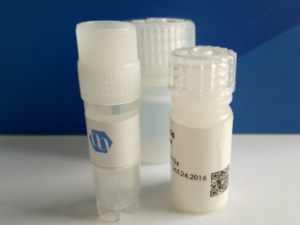$ 850.0
Quantity: 10 MG
In stock
Description
Product name: β-Amyloid (1–42), human
Catalog#: 1244013
Organism: Human
Synonyms: DAEFRHDSGYEVHHQKLVFFAEDVGSNKGAIIGLMVGGVVIA, Amyloid beta-peptide (1-42), amyloid-beta (Aβ1-42), Beta-amyloid protein 42,Aβ42, Abeta,amyloid beta peptides,Beta-amyloid 42, Abeta42, Amyloid beta 1-42, Abeta1-42, Abeta42, amyloid-beta 1-42, amyloid β peptide (1–42), Amyloid β Protein Fragment 1-42, β-Amyloid (1–42),
CAS NO.:107761-42-2
Sequence: Asp-Ala-Glu-Phe-Arg-His-Asp-Ser-Gly-Tyr-Glu-Val-His-His-Gln-Lys-Leu-Val-Phe-Phe-Ala-Glu-Asp-Val-Gly-Ser-Asn-Lys-Gly-Ala-Ile-Ile-Gly-Leu-Met-Val-Gly-Gly-Val-Val-Ile-Ala
M.W: 4514.04
M.F.: C203H311N55O60S
Purity: 95%
Counter ion: Trifluoacetate
Format: Lyophilized powder
Description: Beta-amyloid protein is thought to play a major role in the development of Alzheimer’s disease. The more common form of the peptide has only 40 amino acids, but the 42AA peptide has a greater tendency to form plaques.High levels of plasma Aβ42 in patients with acute intracerebral hemorrhage are associated with a poor functional prognosis. Amyloid fibrils have been shown to exert their toxicity by modulating the immune system. Amyloid fibrils formed from different pathological or non-pathological proteins or peptides activate macrophages and microglia, leading to the secretion of pro-inflammatory molecules, such as TNF-α, IL-6, IL-1β and NO.
Uniprot ID: P05067
Compound ID: 57339251
Usage: For Scientific Research Use Only, Not for Human Use.

